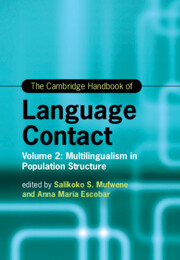Book contents
- The Cambridge Handbook of Language Contact
- Cambridge Handbooks in Language and Linguistics
- The Cambridge Handbook of Language Contact
- Copyright page
- Contents
- Maps Volume II
- Figures Volume II
- Tables Volume II
- Contributors
- Preface
- Introduction
- Part One Multilingualism
- 2 Societal Multilingualism
- 3 Individual Bilingualism
- 4 Codeswitching and Translanguaging
- 5 Urban Contact Dialects
- 6 Multilingualism and Super-Diversity: Some Historical and Contrastive Perspectives
- 7 Multilingualism and Language Contact in Signing Communities
- 8 Multilingualism in India, Southeast Asia, and China
- 9 Monolingualism vs. Multilingualism in Western Europe: Language Regimes in France, Spain, and the United Kingdom
- Part Two Contact, Emergence, and Language Classification
- Part Three Lingua Francas
- Part Four Language Vitality
- Part Five Contact and Language Structures
- Author Index
- Language Index
- Subject Index
- References
4 - Codeswitching and Translanguaging
from Part One - Multilingualism
Published online by Cambridge University Press: 02 June 2022
- The Cambridge Handbook of Language Contact
- Cambridge Handbooks in Language and Linguistics
- The Cambridge Handbook of Language Contact
- Copyright page
- Contents
- Maps Volume II
- Figures Volume II
- Tables Volume II
- Contributors
- Preface
- Introduction
- Part One Multilingualism
- 2 Societal Multilingualism
- 3 Individual Bilingualism
- 4 Codeswitching and Translanguaging
- 5 Urban Contact Dialects
- 6 Multilingualism and Super-Diversity: Some Historical and Contrastive Perspectives
- 7 Multilingualism and Language Contact in Signing Communities
- 8 Multilingualism in India, Southeast Asia, and China
- 9 Monolingualism vs. Multilingualism in Western Europe: Language Regimes in France, Spain, and the United Kingdom
- Part Two Contact, Emergence, and Language Classification
- Part Three Lingua Francas
- Part Four Language Vitality
- Part Five Contact and Language Structures
- Author Index
- Language Index
- Subject Index
- References
Summary
Codeswitchingching, well known as a speech style in which bilinguals alternate languages between or within sentences, has recently been joined by a new term, translanguaging, which is widely used in bilingual education with a similar meaning. Among a variety of perspectives within the translanguaging literature, some scholars have adopted deconstructivism, the view that discrete languages and multilingualism do not actually exist. Deconstructivists see translanguaging as a theoretical alternative to codeswitching, as codeswitching implies internalized linguistic diversity. In this chapter, the author argues that the political use of language names (a concern of deconstructivists) can and should be distinguished from the social and structural idealizations used to study linguistic diversity, favoring what the author calls an Integrated Multilingual Model of bilingualism, contrasted with the Unitary and Dual Competence models. The author further distinguishes grammars from linguistic repertoires, arguing that bilinguals, like everybody, have a single linguistic repertoire but a richly diverse mental grammar, a viewpoint the author calls a multilingual perspective on translanguaging.
Keywords
- Type
- Chapter
- Information
- The Cambridge Handbook of Language ContactVolume 2: Multilingualism in Population Structure, pp. 90 - 114Publisher: Cambridge University PressPrint publication year: 2022

